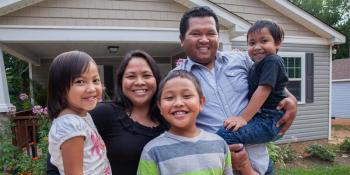460+
policy wins influenced by local and state Habitat organizations
$23.6 billion
unlocked in government funds for home affordability
9.5+ million
people gained access to affordable homes
Cost of Home impact
Measurable transformation in home affordability
In 2019, Habitat for Humanity launched Cost of Home, a five-year home affordability advocacy campaign in the U.S. With the goal of influencing policies to increase access to affordable homes in response to escalating housing challenges, Habitat organizations supported over 460 policy successes and improved access to affordable homes for more than 9.5 million people through Cost of Home.
These achievements are a direct result of the hard work, commitment and support of the Habitat network and Habitat homeowners, partners, sponsors and campaign endorsers throughout the five-year campaign.
Snapshot of Cost of Home successes
Habitat has created a five-year cumulative report that showcases how more than 400 state and local Habitat organizations have worked collectively with all levels of government to shape policies that bring the cost of home within reach for households across the nation. Some of these efforts include:
Clallam County Habitat for Humanity worked with its local government to secure over $700,000 in State and Local Fiscal Recovery Funds from the American Rescue Plan Act, allowing the affiliate to provide older adults with the opportunity to age in place; create an advocacy road map for zoning laws; and reinforce the goal of safe, affordable and equitable housing for all.
Habitat for Humanity of Metro Maryland addressed historical injustices and fostered an inclusive environment by combatting exclusionary zoning and reviving Heritage Emory Grove, preserving the resilience of the African American community, and creating a revitalized neighborhood with mixed-income housing and diverse recreational spaces.
Habitat for Humanity of Iowa, an affiliate support organization, successfully launched a pilot Housing Renewal Program in the state, offering a new resource in grants to affiliates and housing organizations and helped address Iowa’s aging housing stock and ease financial burdens on low-income households, with support from a Cost of Home grant.
Discover our impact
Explore some of the policy successes supported by local and state Habitat organizations through interactive maps, a searchable database with an accompanying typology brief, and a research report:
The research report and resources above – released by the Urban Institute, a nonpartisan research organization that provides data and evidence to help advance upward mobility and equity, and funded by Habitat for Humanity – provides evidence that policy and systems change supported by local and state Habitat organizations that participated in Cost of Home created measurable transformation in home affordability in communities around the country.
How Cost of Home enabled policy successes
In our proven approach, the Habitat network utilized six key strategies for change, which were critical to the Cost of Home campaign’s success:
- Developing a national strategy for local action.
- Building capacity and community advocating power.
- Engaging communities and assessing needs on the ground.
- Forming coalitions with other local organizations.
- Leveraging small policy wins to help build relationships with policymakers and lay the foundation for major policy and systems change.
- Scaling solutions to deliver real change for a diversity of stakeholders.
Cost of Home campaign progress reports
These annual updates provide a snapshot of the collective progress that were being made to change housing policies and systems through the Cost of Home campaign.


